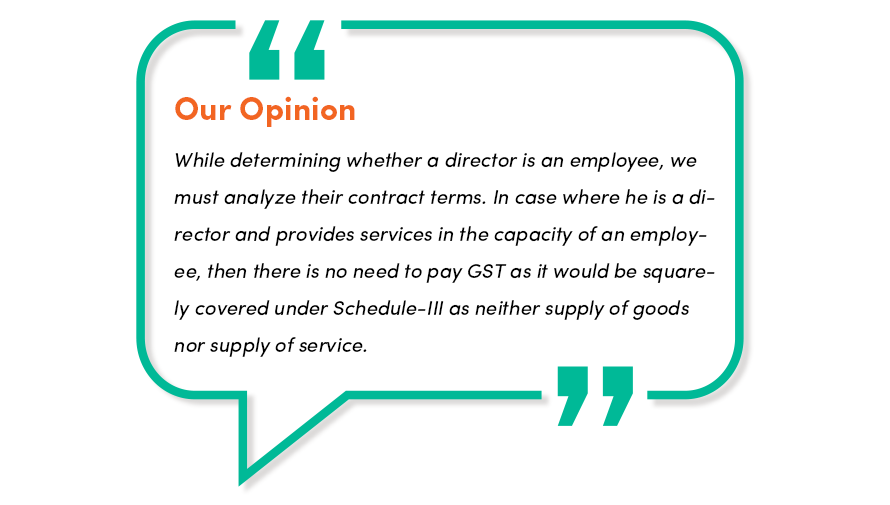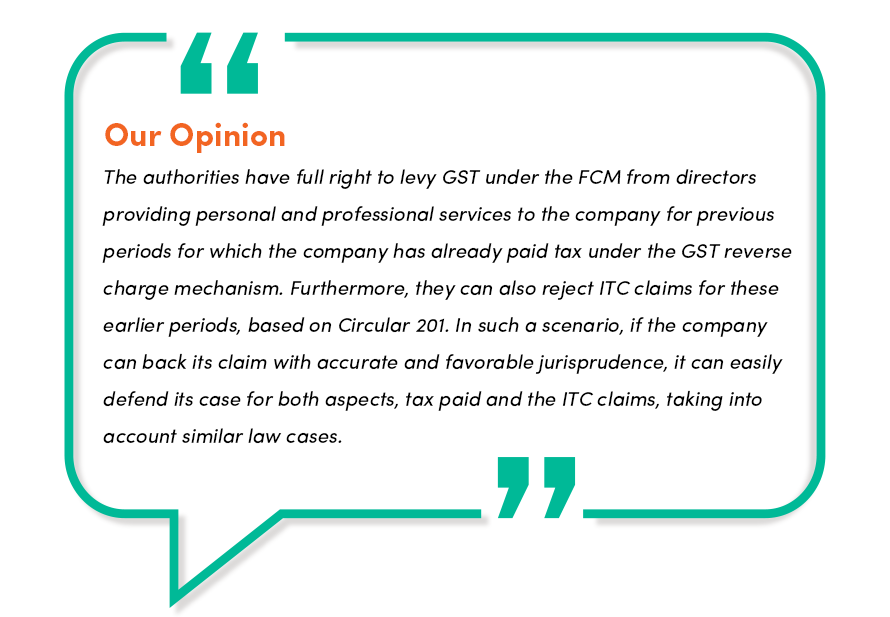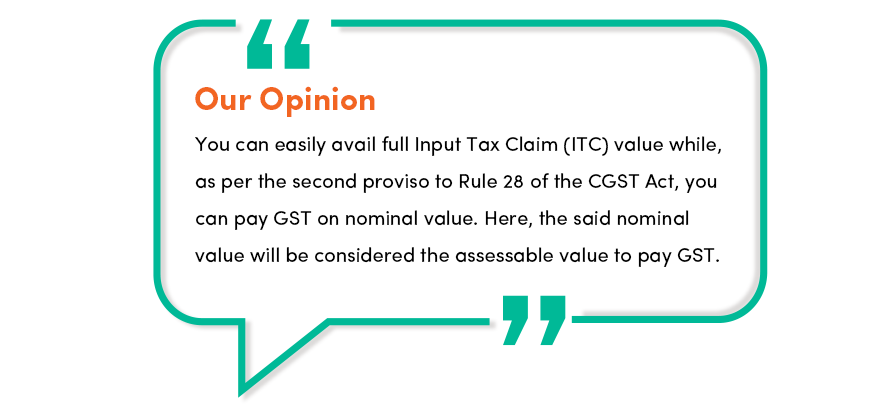Treatment of Reverse Charge Mechanism (RCM in GST) For Services Provided By Company Directors
Under the Goods and Services Tax (GST) system in India, when a director of a company provides any service to the said company in the capacity of being a director, he falls under the provisions of the GST Reverse Charge Mechanism (RCM in GST). Here, the liability of paying GST on the service lies with the buyer, in this case, the company.
This GST provision has created much confusion in the last few years, where the services provided by directors and the definition of a company director have been unclear. GST authority has introduced several mechanisms to ensure the smooth flow of taxation, and Circular 140/10/2020-GST and Circular 201/13/2023-GST were submitted to streamline the concept of GST Reverse Charge Mechanism for Company Director’s Services.
The clarification becomes even more pertinent in light of numerous frauds and tax evasion breaches in India. With directors of companies allegedly failing to exercise suitable diligence in the discharge of their duties and how the law is molded for personal gains, legal authorities have made & implemented clear regulations to avoid illegal scenarios from being perpetrated.

How GST is Applicable in Case of Services Provided By Director
Company directors can offer various services, such as consultancy, advisory, or managerial services. It’s important to note that not all services directors provide fall within the reverse charge under GST. Only specific services are subject to this mechanism.

Our Opinion – While determining whether a director is an employee, we must analyze their contract terms. In case where he is a director and provides services in the capacity of an employee, then there is no need to pay GST as it would be squarely covered under Schedule-III as neither supply of goods nor supply of service.
Independent Directors
Also, to underscore the capacity of a director in a company. If a director falls under the independent director definition as per section 149(6) of the Companies Act, 2013. If yes, then the Salary or fees paid to them by the company fall under the GST on reverse charge mechanism, and the onus to pay the GST will lie with the company or the corporate body.
Non-Executive Directors
Another case is when an individual works for a company in the capacity of a non-executive director, meaning they are part-time directors of the organization. Their work is considered a “service provided by them” on which they receive remuneration, and they come under the provisions of the GST reverse mechanism. The company must pay the GST here.
Executive Directors
An executive director is a person working as a full-time employee of a company, and they act as a director in some capacity, whether as a managing director or a whole-time director.
When Director Receives Salary Received for Services Rendered
If such a person provides any services to the company and his remuneration is treated as “Salary” in the books of the company and subject to TDS under section 192, they do not fall under the provisions of GST, and hence, no GST is taxed on them, as per the CGST Act 2017.
When the Director’s Remuneration is Not Declared as a Salary
When a director’s services entail a fee or remuneration that is not declared as Salary in the company’s books, such fees are taxed a GST amount while it falls under the GST reverse charge mechanism. The onus to pay the tax lies with the company or body corporate.
Example 1: XYZ Ltd. has two directors, Mr. A (executive director) and Mr. B (non-executive director). Mr. A provides management consultancy services to the company. GST is charged as usual in this case, and there’s no RCM applicability under GST. However, if Mr. B, the non-executive director, offers similar services, the GST on reverse charge applies.
When Does a Director Do Not Come Under Purview of RCM applicability under GST?
If a director, irrespective of whether he is an executive, non-executive, or independent director, offers any service to the company in his personal or individual capacity. In that case, he must pay GST under the forward charge. Here, he is considered a supplier of taxable supply. The GST will apply per the legal threshold limit of aggregate turnover in FY for registration.

Our Opinion – The authorities have full right to levy GST under the FCM from directors providing personal and professional services to the company for previous periods for which the company has already paid tax under the GST on reverse charge mechanism. Furthermore, they can also reject ITC claims for these earlier periods, based on Circular 201. In such a scenario, if the company can back its claim with accurate and favorable jurisprudence, it can easily defend its case for both aspects, tax paid and the ITC claims, taking into account similar law cases.
Examples of taxable services provided by directors where they pay GST on forward charge mechanism:
- When director rents out commercial premises to the company.
- Services of a Professional nature while the director possesses the requisite qualification for the practice of the profession as per the Nomination and Remuneration Committee or BOD.
- If the director sells goods to the company.
- The director receives a commission for investments made by him.
- The director gives a financial guarantee on behalf of the company to facilitate a bank loan, overdraft, or any other credit facility.
Treatment of GST When The Director is a Related Person
When a company director provides a guarantee to a bank, as per the RBI circular, he cannot ask for any consideration or remuneration, whether in cash or kind, from the company for the said financial guarantee. RBI Circular considers these services as supply, and the director does not pay GST on this.
But there is an exception here. If the director and company come under the definition of related persons as per Section 15 of the CGST Act, then the GST under the forward charge mechanism is chargeable to them. A director is considered a related person when they control the company’s affairs, holds 25% or more shares of the company, or is an employee of the company.

Our Opinion – You can easily avail full Input Tax Claim (ITC) value while, as per the second proviso to Rule 28 of the CGST Act, you can pay GST on nominal value. Here, the said nominal value will be considered the assessable value to pay GST.
Compliance and Documentation
Businesses that come under the RCM applicability under GST must comply with certain rules and maintain proper documentation. This includes:
– Issuing a tax invoice mentioning that tax is payable on a reverse charge under GST basis.
– Calculating and paying the tax liability.
– Filing relevant GST returns, such as GSTR-3B, GSTR-9, GSTR-1, among others.
Input Tax Credit (ITC) Under GST Reverse Mechanism
One crucial question is whether businesses can claim Input Tax Credit (ITC) on services under reverse charge. The answer is yes but with certain restrictions. ITC can be claimed only for services used for business purposes and not for personal consumption.
Example: ABC Ltd. pays GST under the reverse charge mechanism for the legal services provided by a director. If these legal services are utilized solely for business purposes, ABC Ltd. can claim ITC.
Practical Scenarios – Let’s consider two practical scenarios:
Scenario 1: A small business engages a non-executive director for strategic advice. Since the company is registered under GST, it must pay taxes as per reverse charge under GST for the director’s services.
Scenario 2: A multinational corporation hires a management consultant who is an executive director. GST is charged as usual in this case, and there’s no reverse charge.
Impact on Small Businesses & Companies
The reverse charge mechanism can impact small businesses, requiring them to manage additional compliance burdens, financial responsibilities, increased administrative costs, and cash flow problems. Small companies should stay informed about their GST obligations and seek professional advice.
They often need more resources or expertise to calculate and pay the tax amount accurately. It’s pertinent to mitigate this impact by understanding the latest jurisdictions that provide exemptions or thresholds based on turnover or the value of the transaction. These exemptions help reduce the compliance burden and cash flow problems small businesses & companies face.
Conclusion
In conclusion, understanding the treatment of services provided by directors under the GST reverse mechanism is essential for businesses. It’s more complex than it may seem at first glance, and so correct guidelines and regulatory expertise are essential when dealing with reverse charge under GST for company director’s services.
